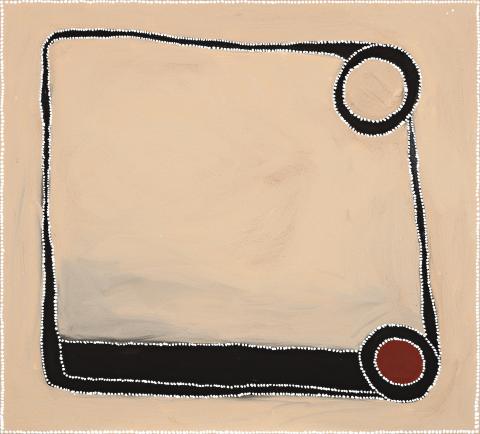CAMEL GAP, 2002
PADDY NYUNKUNY BEDFORD
ochres and pigments with synthetic binder on linen
122.0 x 135.0 cm
Jirrawun Arts, Kununurra
GrantPirrie Gallery, Sydney
Private collection, Sydney
Significant Paintings, GrantPirrie Gallery, Sydney, 6 November – 30 November, 2002
Paddy Bedford, Museum of Contemporary Art, Sydney, 6 December 2006 – 15 April 2007; Art Gallery of Western Australia, Perth, 12 May – 22 July 2007 (label attached verso)
Storer, R., Paddy Bedford, Museum of Contemporary Art, Sydney, 2006, pp. 92, 152 (illus.)
Camel Gap, 2004, collection Museum of Contemporary Art, Sydney, illus. in Barkley, G. et al., MCA Collection; Volume 1, Museum of Contemporary Art, Sydney, 2012, pp. 175
For another version of this story see Camel Gap, 2002, in the Essl collection, Austria, illus. in Petitjean G., et al., Paddy Bedford; Crossing Frontiers, Aboriginal Art Museum Utrecht and Snoeck Editions, the Netherlands, 2010, p. 11
Paddy Bedford, or Nyunkuny, was a senior Gija law man and painter in the eastern Kimberley. He was born and raised on Bedford Station where he worked for rations as a stockman. He also spent time on Greenvale and Bow River Stations before returning to Bedford Downs. As with most Aboriginal people in the eastern Kimberley, Bedford continued traditional practices and ceremony which provided the opportunities for him to paint. His first paintings in the public domain, however, were made when he joined the Jirrawun Art group established by Freddie Timms at Rugun (Crocodile Hole) in 1997. Bedford went on to become one of the senior artists of the group, having been accorded a retrospective exhibition at the Museum of Contemporary Art, Sydney, in 2006 and touring nationally to Perth, Bendigo and Brisbane.
Camel Gap, known as Gernawarliyan to the local Gija people is located to the south-east of Bedford Downs adjacent to Marty’s bore. It is a site in the artist's mother's traditional lands where the ancestral goanna, Garndoowoolany camped in the Dreaming (Ngarranggarni). The site is indicated in the painting by the roundels. It was here that Garndoowoolany called out to the dingo Marranyji who was standing on a hill. Marranyji became stuck and was transformed into a rock. The modern name of the site dates back to the time when Afghani traders took their camels through the eastern Kimberley to the port of Wyndham. The rock itself, situated in the red ochre corner in the painting, is said to be in the shape of a camel.
Bedford painted with a deep sense of cultural responsibility. Throughout much of his professional practice this respected senior Gija artist and lawman painted stories from either his Father’s Country or his Mother’s and Uncle’s Country. He was major custodian of three significant sites; Emu Dreaming, Bush Turkey Dreaming and Cockatoo Dreaming
CRISPIN GUTTERIDGE
